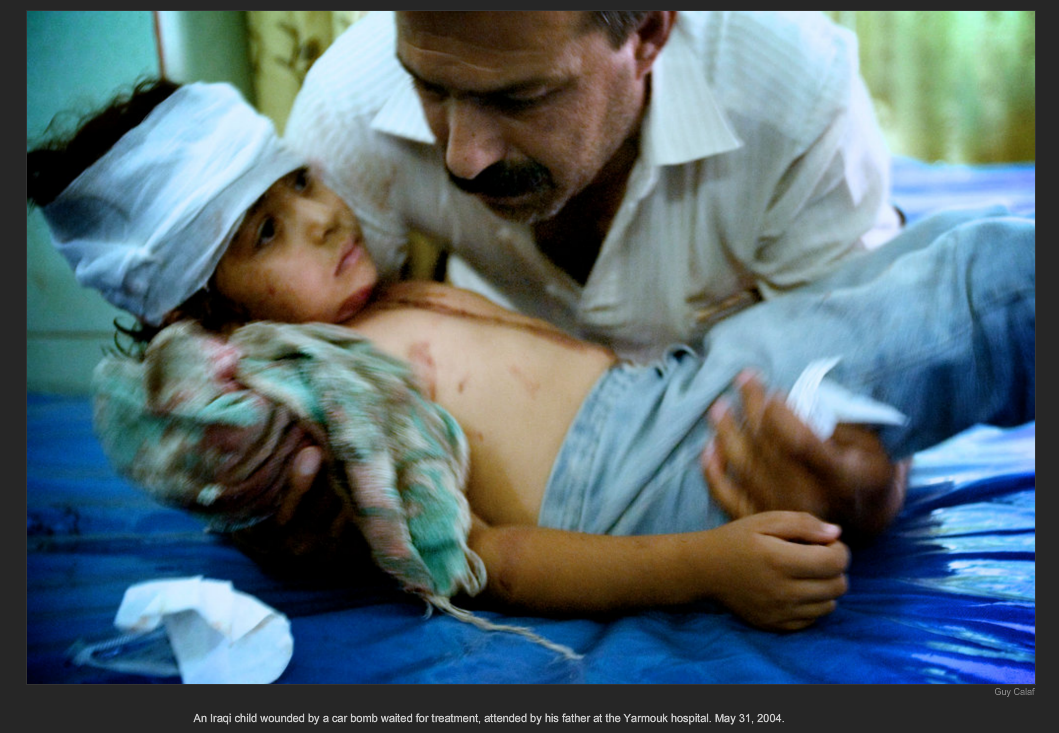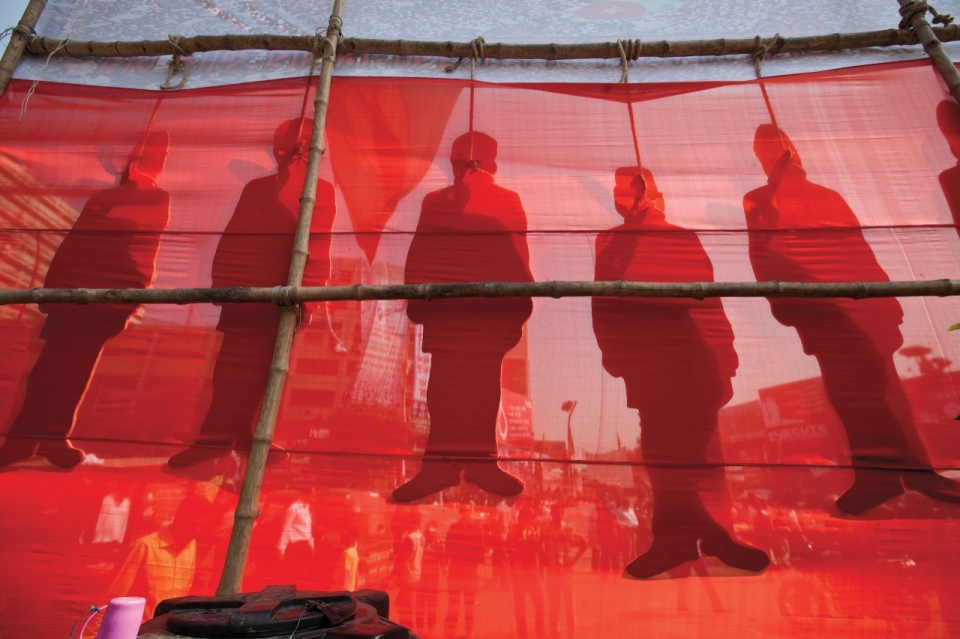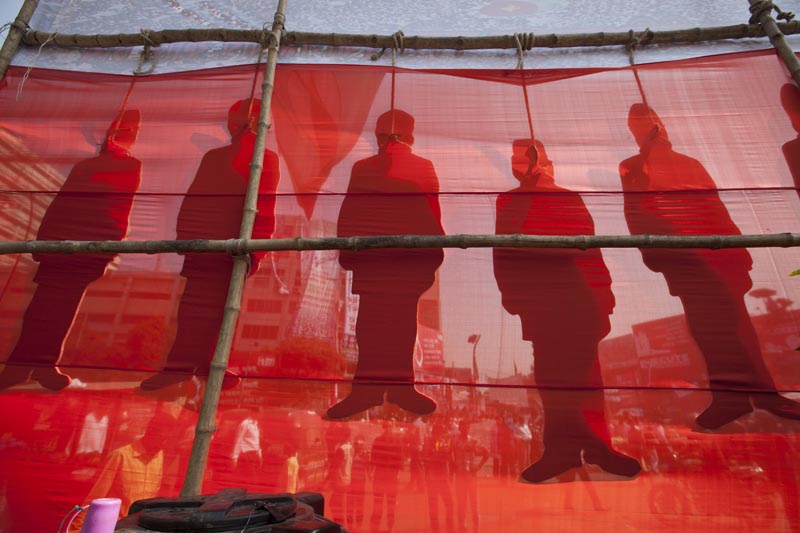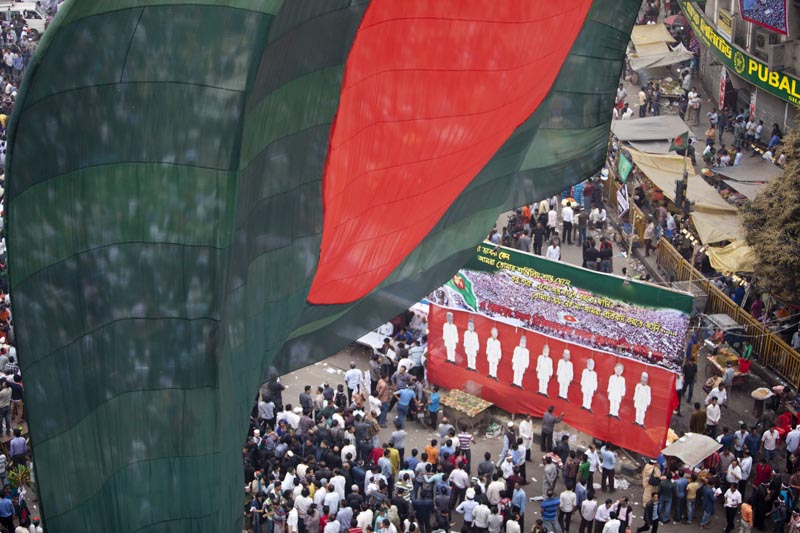By?JAMES ESTRIN?in New York Times Lens Blog

Continue reading “Witnesses to War”
Musings by Shahidul Alam

Hundreds of thousands of people?have held?protests in Bangladesh to demand?that the government introduce an anti-blasphemy law that would include the death penalty for bloggers who insult Islam.
Protest organisers called Saturday’s rally the “long march”, with many travelling from remote villages to the capital, Dhaka’s Motijheel area that became a sea of white skull caps and robes. Continue reading “Al Jazeera: Bangladesh protesters demand blasphemy law”
Asif Mohiuddin, a?militant atheist blogger?who has been hounded by Bangladeshi Islamists and officials, was arrested today by the Detective Branch of the Dhaka police and is currently being interrogated about his recent posts. The police say he could be taken before a judge tomorrow.
?We call for Mohiuddin?s immediate and unconditional release,? Reporters Without Borders said. ?After being the victim of knife attack in January, he is in very poor health and needs constant medical attention. The Detective Branch told us he is being ?treated well? but the opposite is happening ? he continues to be held in deplorable conditions of hygiene and lack of access to medical treatment. Continue reading “Blogger Asif Mohiuddin arrested over ?blasphemous? blog posts”
Begum Khaleda Zia’s snub to Pranab Mukherjee sadly confirmed that Bangladeshis are still fighting yesterday’s battles. They still suffer from the dilemma Zulfikar Ali Bhutto tried to exploit by arguing mischievously during the liberation war that if “Muslim Bangla” was primarily Bengali, it should merge with West Bengal. If it was Islamic, it should remain in Pakistan. Continue reading “The anomaly of a secular Bangladesh”

Bangladeshi police detain a supporter of the opposition Bangladesh Nationalist Party during a protest in Dhaka. Photo: AFP
I write this column with some regret. As a college student, among the bylines I grew up admiring was that of S.N.M. Abdi, who was a young reporter in the late 1970s, and exposed one of the most horrendous examples of police brutality in post-independence India?the blinding of undertrial prisoners in Bhagalpur in Bihar. Some politicians defended that barbarism, saying the practice had ?social sanction?. But Abdi rightly focused on the atrocity, stirring the nation?s conscience, which was at that time still reeling from the effects of the emergency. Continue reading “Playing ball with the Jamaat”

When President Pranab Mukherjee visited Bangladesh earlier this week, its opposition leader Khaleda Zia (above) of the BNP did not meet him, because of public strikes that her ally, Jamaat-i-Islami, has been calling to protest the verdicts of the Bangladesh International Crimes Tribunal. Photo: AFP
Earlier this week, when President?Pranab Mukherjee?visited Bangladesh, its opposition leader?Khaleda Zia?of the Bangladesh National Party (BNP) did not meet him, because of public strikes that her ally, Jamaat-i-Islami, has been calling to protest the verdicts of the Bangladesh International Crimes Tribunal. The BNP called another strike this week in sympathy with the Jamaat, whose leaders are, one by one, being convicted of war crimes by the Tribunal. Continue reading “Fire in Sonar Bangla”

Bangladesh?s quest for closure threatens to morph into the paralysing dysfunctionality that has characterized its politics. Photo: Wikimedia Commons
One of the truly significant aspects about the emotional upsurge at Shahbag in Dhaka?the hundreds of thousands of candles, the portrait of Jahanara Imam who lost her son in the liberation war in 1971 and fought for the rest of her life seeking justice?is that an overwhelmingly large number of the demonstrators are under the age of 40. Most were not born when Bangladesh emerged from its blood-soaked birth. Their fight is outwardly for an even harsher punishment (meaning death) for Abdul Kader Mullah, the Jamaat-i-Islami leader who foolishly flashed a victory sign when he was sentenced to life in prison for complicity in war crimes, and others against whom verdicts are awaited. But more fundamentally, they are trying to regain history, to assert their identity. Too often has the promise of Bangla nationalism been stolen, its national aspiration challenged, its spirit of unity based on language?irrespective of faith?reviled, its past rewritten, and the generation that fought for independence betrayed. Now it is time to reclaim the past. Continue reading “Crowds and justice at Shahbag”

A campaign of violence by Bangladesh?s main Islamist party, Jamaat-e-Islami, has left 74 people dead since February 28. They are protesting the death sentence handed down against senior Jamaat leader Delwar Hossain Sayedee by the International Crimes Tribunal, set up by the ruling Awami League.

Continue reading “Bangladesh?s Unfinished War”
Bangladesh’s Winter of Discontent
Published: February 28, 2013. DHAKA, Bangladesh


FOR the past month, tens of thousands of Bangladeshis have filled Shahbagh Square here, demanding justice for crimes committed in 1971, when Bangladesh (formerly East Pakistan) attained its independence from Pakistan.
